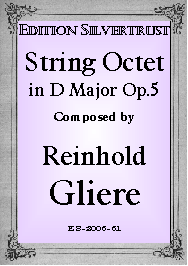Presents
Reinhold Gliere
String Octet in D Major, Op.5
 Reinhold
Gliere (1875-1956) was born in the then Russian city Kiev. He began his
musical studies there with the famous violin teacher Otakar Sevcik, among others. He
then went to the Moscow Conservatory where he studied with Sergei Taneyev, Anton
Arensky and Mikhail Ippolitov-Ivanov. His reputation today rests primarily upon
his symphonies, ballets and operas, however, he was also a composer of superb
chamber music. His outstanding compositional technique was quickly recognized
by his teachers and he won several prizes for his early works, including his
First String Sextet which took the prestigious Glinka Prize from a jury
consisting of Rimsky-Korsakov, Glazunov and Liadov. Gliere, himself, taught at
the Moscow and Kiev conservatories for nearly 40 years. Among his many
successful students were Khachturian, Prokofiev and Miaskovsky.
Reinhold
Gliere (1875-1956) was born in the then Russian city Kiev. He began his
musical studies there with the famous violin teacher Otakar Sevcik, among others. He
then went to the Moscow Conservatory where he studied with Sergei Taneyev, Anton
Arensky and Mikhail Ippolitov-Ivanov. His reputation today rests primarily upon
his symphonies, ballets and operas, however, he was also a composer of superb
chamber music. His outstanding compositional technique was quickly recognized
by his teachers and he won several prizes for his early works, including his
First String Sextet which took the prestigious Glinka Prize from a jury
consisting of Rimsky-Korsakov, Glazunov and Liadov. Gliere, himself, taught at
the Moscow and Kiev conservatories for nearly 40 years. Among his many
successful students were Khachturian, Prokofiev and Miaskovsky.
Of Gliere's Octet, the respected scholar and critic Professor Sabaneiev wrote:
"The Octet, a fine work, proves that Gliere was supremely qualified to deal with larger chamber ensembles. The Octet amazes one by the fullness of resonance and the masterly treatment of the instruments. Gliere’s melodies are full of feeling and emotion, fine sonority and noble harmony."
The Octet dates from 1900 and was dedicated to Jan Hrimaly, Gliere’s violin teacher at the Conservatory. Wilhelm Altmann, perhaps the most famous chamber music critic of all, writes of it:
I cannot recommend this work for public performance enough. It is shot through and through with magnificent melody, all of the parts are grateful to play, and it sounds very good.”
The Octet met with immediate success at its premiere, and ever since it has been recognized as being among the very best octets ever written. It opens with a full-blooded Allegro moderato. Both the energetic and optimistic main theme and the calm but very melodious second theme are unmistakably Russian. The second movement, also an Allegro, is an elegant intermezzo with a soulful Russian melody as the middle section. The slow movement, Andante, comes third and features a very melodious subject which is first presented in a soft and calm fashion. During the rest of the entire movement, Gliere slowly builds tension along with the dynamic level, reaching a powerful climax just before the movement’s close. The finale, another Allegro, sports two tonally rich main themes, each distinguished by a very colorful sound palette. The writing verges on the orchestral at many points, perhaps most notably in the powerful conclusion.
There is no argument that this is one of the finest, if not the finest, romantic string octet ever composed--a work which deserves to be heard in concert as often as Mendelssohn’s Octet and which will present no difficulties for experienced amateurs.
|
(A) Parts (US & Non US Addresses) |
$59.95 |
|
|
(B) Parts & Score US Addresses |
$99.95 |
|
|
(C) Parts & Score NON US Addresses |
$119.95 |